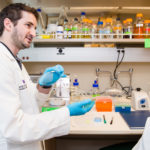Recently promoted faculty are finding news ways to solve significant population health problems from Alzheimer’s and related dementias to kidney disease to cancer to MRSA. These preeminent researchers were all recently awarded promotions. Learn more about their research and read stories about their innovative research below.
 Abhinav Nath, PhD, Associate Professor, Department of Medicinal Chemistry
Abhinav Nath, PhD, Associate Professor, Department of Medicinal Chemistry
Abhi and his group are developing new and powerful methods to characterize and control protein dynamics, building on recent advances in biophysics, biochemistry and pharmacology from groups around the world. They focus on proteins involved in degenerative disorders (such as Alzheimer’s disease), the oxidative stress response, and drug metabolism. Read more.

Ed Kelly, PhD, Department of Pharmaceutics Associate Professor, awarded tenure
In the broadest sense, the Kelly lab research interests are within the realm of preclinical biology. In particular, we are interested in applying novel technology platforms to address the 3 Rs of toxicology in animal testing, reduce, refine and replace. Active areas of research in the Kelly lab focus on ex vivo modeling of human organ physiology and toxicological responses to drug/xenobiotic challenge. These project makes use of “organs on chips” or microphysiological systems (MPS) populated with primary and stem-cell derived cell types to recapitulate two key ADME organs, the liver and kidney as alternatives to preclinical animal toxicology studies. Recent work is extending MPS technologies to model select human diseases as well as how organs respond to the extreme environment of microgravity on the International Space Station. Read more about Kidney Chips in space.

Aasthaa Bansal, PhD, Associate Professor, Department of Pharmacy
Aasthaa’s research focuses on sequential decision-making using longitudinal data, prediction modeling, decision theoretic methods including value of information analysis, and comparative effectiveness and outcomes research using large healthcare claims databases and EHR data. She is the PI of a study to develop methods for cost-effective personalized risk-adaptive surveillance in cancer and leads the team of investigators that received a prestigious NIH MERIT Award. Read more.
 Brian Werth, PharmD, Associate Professor, Department of Pharmacy
Brian Werth, PharmD, Associate Professor, Department of Pharmacy
Brian’sresearch interest is in antimicrobial resistance and the pharmacokinetics and pharmacodynamics of antimicrobials. His interdisciplinary translational research program is primarily focused on understanding the mechanisms of cross-resistance among glycopeptides, lipopeptides, and lipoglycopeptides in Methicillin-Resistant Staphylococcus aureus (MRSA). Read more.
 Cathy Yeung, PharmD, PhD, Assistant Professor, Department of Pharmacy
Cathy Yeung, PharmD, PhD, Assistant Professor, Department of Pharmacy
Cathy’s research includes both basic science and translational studies, and spans from the determination of molecular mechanisms of altered drug metabolism using 3-dimensional cell culture techniques to the evaluation of the effect of drugs and nutritional supplements on health outcomes in patients receiving hemodialysis. She is a key investigator in the development of a “kidney on a chip” microphysiological system that can be used in preclinical drug development. Read more about Kidney Chips in space.
Congratulations to all!
To study with researchers like these, click on the links for more information about our Graduate Programs in Medicinal Chemistry, Pharmaceutics, Pharmaceutical Outcomes Research and Policy, and Biomedical Regulatory Affairs.
Want to earn your PharmD professional degree at the UW? Start here to learn more.